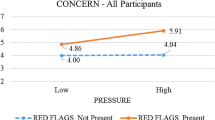Abstract
We address a previous finding in the business ethics literature in which accounting professionals in higher rank levels, i.e., “manager” or “partner” of auditing firms, appear to have lower moral reasoning ability than their junior counterparts. Prior investigations have relied upon a similar methodology for estimating ethical beliefs, namely testing “moral reasoning ability” using either the Moral Judgment Interview or Defining Issues Test. In the present study, we use a multiple vignettes approach to test for the existence of the inverse rank-ethical beliefs effect. With only 2 of the 30 vignettes resulting in both managers and partners being more accepting of the ethically charged behaviors, the results presented here using this alternative methodology are generally not supportive of the inverse rank-ethical beliefs phenomenon. We also use a multivariate analysis in order to control for demographic characteristics. Our results suggest that the most robust predictor of ethical attitudes among accounting practitioners is age, not rank within a firm.
Similar content being viewed by others
References
Armstrong, M. B.: 1987, ‹Moral Development and Accounting Education’, Journal of Accounting Education (Spring), 27–43. doi:10.1016/0748-5751(87)90036-4.
Armstrong, J.S., & Overton, T.S. (1977). Estimating Nonresponse Bias in Mail Surveys. JMR, Journal of Marketing Research, 14(3), 396–402. doi:10.2307/3150783.
Bollen, K.: 1989, Structural Equations with Latent Variables, (John Wiley and Sons: New York).
Borkowski, S. and Y. Ugras: 1998, ‹Business Students and Ethics: A Meta-Analysis’, Journal of Business Ethics 17, 1117-1127.
Callahan, S.: 1990, ‹Is Gender Germane?’, Health Progress, 21–24.
Cavanaugh, G. F. and D. F. Fritzsche: 1985, ‹Using Vignettes in Business Ethics Research’, in Preston, L. E. (Ed.), Research in Corporate Social Performance and Policy (JAI Press, Inc.: Greenwich, CN), 279-293.
Clark, J.: 1966, Religion and the Moral Standards of American Businessmen, (South-Western Publishing Co.: Cincinnati).
Colby, A. and L. Kohlberg: 1987, The Measurement of Moral Judgment (Cambridge University Press: New York).
Conroy, S. J. and T. L. N. Emerson: 2004, `Business Ethics and Religion: Religiosity as a Predictor of Ethical Awareness Among Students', Journal of Business Ethics 50(4), 383–396.
Conroy, S. J. and T. L. N. Emerson: 2006, `Changing Ethical Attitudes: The Case of Enron and ImClone Scandals', Social Science Quarterly 87(2), 395–410
DeVellis, R. F.: 1991, ‹Scale Development: Theory and Applications’, Applied Social Research Methods Series, Volume 26 (Sage Publications: Newbury Park, CA).
Elias, R. Z: 2002, ‹Determinants of Earnings: Management Ethics Among Accountants’, Journal of Business Ethics, September, 40, 33-45.
Emerson, T. L. N., S. J. Conroy and C. W. Stanley: 2007, `Ethical Attitudes of Accountants: Recent Evidence from a Practitioners' Survey', Journal of Business Ethics 71(1), 73–87.
Eynon, G., N. T. Hill and K. T. Stevens: 1997, ‹Factors that Influence the Moral Reasoning Abilities of Accountants: Implications for Universities and the Profession’, Journal of Business Ethics 16 (September), 1297-1309.
Fritzsche, D. and H. Becker: 1982, ‹Business Ethics of Future Marketing Managers’, Journal of Marketing Education (Fall), 2–7.
Harris, J.: 1991, ‹Ethical Values and Decision Processes of Business and Non-Business Students: A Four-Group Study’, Journal of Legal Studies Education 9, 215-230.
Hunt, S.: 1990, ‹Commentary on an Empirical Investigation of a General Theory of Marketing Ethics’, Journal of the Academy of Marketing Science 18(2), 173-177.
Jones, J., D. W. Massey and L. Thorne. 2003. ‹Auditors’ Ethical Reasoning: Insights from Past Research and Implications for the Future’, Journal of Accounting Literature 22, 45 – 103.
Keller, C. 1988, From a Broken Web: Separation, Sexism and Self. (Boston: Beacon Press).
Kohlberg, L. 1981, The Philosophy of Moral Development: Moral Stages and the Idea of Justice (Harper & Row: San Francisco).
Kohlberg, L. 1984, The Psychology of Moral Development : The Nature and Validity of Moral Stages (Harper & Row: San Francisco).
Lampe, J. C. and D. W. Finn: 1992, ‹A Model of Auditors’ Ethical Decision Processes’, Auditing: A Journal of Practice & Theory (Supplement) 11, 33-59.
Longenecker, J. G., J. A. McKinney and C. W. Moore: 1989, ‹Ethics in Small Business’, Journal of Small Business Management (January), 27–31.
Maddala, G.: 1983, Limited-Dependent and Qualitative Variables in Econometrics (Cambridge University Press: New York).
Ponemon, L. A.: 1990, ‹Ethical Judgments in Accounting: A Cognitive-Developmental Perspective’, Critical Perspectives on Accounting 1, 191-215.
Ponemon, L. A.: 1992, ‹Ethical Reasoning and Selection-Socialization in Accounting’, Accounting, Organizations and Society 17(3/4), 239-258.
Ponemon, L. A. and D. R. L. Gabhart: 1993. Ethical Reasoning in Accounting and Auditing, (Canadian General Accountants’ Research Foundation: Vancouver, CA).
Ponemon, L. A. and D. R. L. Gabhart: 1994, ‹Ethical Reasoning Research in the Accounting and Auditing Professions’, in Rest, J. R. and D. Narvaez (Eds.) Moral Development in the Professions: Psychology and Applied Ethics (Lawrence Erlbaum Associates, Publishers: Hillsdale, NJ).
Rest, J. (1979) Development in Judging Moral Issues. University of Minnesota Press: Minneapolis MN.
Shaub, M. K.: 1994, ‹An Analysis of the Association of Traditional Demographic Variables with the Moral Reasoning of Auditing Students and Auditors’, Journal of Accounting Education 12(1), 1 – 26.
Smith, P. L. and E. F. Oakley: 1997, ‹Gender-Related Differences in Ethical and Social Values of Business Students: Implications for Management’, Journal of Business Ethics 16: 37-45.
Sweeney, J. T. and D. G. Fisher: 1998, ‹An Examination of the Validity of a New Measure of Moral Judgment’, Behavioral Research in Accounting 10, 138-158.
Author information
Authors and Affiliations
Corresponding authors
Rights and permissions
About this article
Cite this article
Conroy, S.J., Emerson, T.L.N. & Pons, F. Ethical Attitudes of Accounting Practitioners: Are Rank and Ethical Attitudes Related?. J Bus Ethics 91, 183–194 (2010). https://doi.org/10.1007/s10551-009-0076-2
Received:
Accepted:
Published:
Issue Date:
DOI: https://doi.org/10.1007/s10551-009-0076-2




